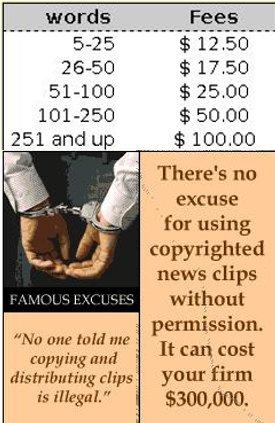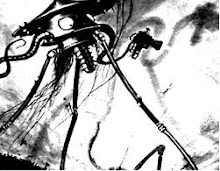Associated Press Attempts to Destroy Journalism
Patrick Hayden wrote on Monday that the Associated Press is now charging fees for individuals to quote as little as five words from AP articles. I'll borrow the graphic from Cory Doctorow to illustrate the insanity the AP has decided to spiral downwards into. Furthermore, Hayden writes that the AP reserves the right to terminate any license if the user criticizes the AP. From the AP's Terms of Use:
Furthermore, Hayden writes that the AP reserves the right to terminate any license if the user criticizes the AP. From the AP's Terms of Use:
You shall not use the Content in any manner or context that will be in any way derogatory to the author, the publication from which the Content came, or any person connected with the creation of the Content or depicted in the Content. You agree not to use the Content in any manner or context that will be in any way derogatory to or damaging to the reputation of Publisher, its licensors, or any person connected with the creation of the Content or referenced in the Content […]Whatever happened to fair use?Publisher reserves the right to terminate this Agreement at any time if Publisher or its agents finds Your use of the licensed Content to be offensive and/or damaging to Publisher’s reputation.
Section 107 contains a list of the various purposes for which the reproduction of a particular work may be considered “fair,” such as criticism, comment, news reporting, teaching, scholarship, and research. [emphasis mine]
Aren't those the activities that journalists, bloggers, and other interested individuals engage in when quoting a news story like those provided by the AP?
The AP has reported that the organization will be meeting with bloggers to address their "assertion of copyright." I'll quote the article at length, and without an unconstitutional license from the assholes at the AP:
The Associated Press, following criticism from bloggers over an AP assertion of copyright, plans to meet this week with a bloggers' group to help form guidelines under which AP news stories could be quoted online.And that's exactly what the AP is trying to do; the organization is trying to go beyond what is legally permissible. Moreover, the AP has proven itself unable to uphold journalistic standards and democratic ideals:
[...]
Wendy Seltzer, a legal scholar and a fellow at the Berkman Center for Internet and Society at Harvard University, said it was encouraging that AP wanted to find an arrangement with bloggers to facilitate a mutually agreeable way for them to use AP content.
But she cautioned that the news organization, a not-for-profit cooperative owned by its member newspapers and broadcasters, should not try to go beyond what's legally permissible.
[Jim] Kennedy [AP Director of Strategic Planning] said the AP had both a journalistic concern about preventing AP news from being quoted out of context and also a business concern about protecting the value of AP's news from being diluted if its key elements are made available from places that aren't licensed.Un-fucking-believable.
[UPDATE]: Michael Arrington of TechCrunch sums it up quite well:
The A.P. doesn’t get to make its own rules around how its content is used, if those rules are stricter than the law allows. So even though they say they are making these new guidelines in the spirit of cooperation, it’s clear that, like the RIAA and MPAA, they are trying to claw their way to a set of property rights that don’t exist today and that they are not legally entitled to. And like the RIAA and MPAA, this is done to protect a dying business model -- paid content.[UPDATE 2]: The Associated Press capitulates.



No comments:
Post a Comment